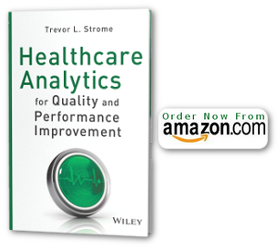Healthcare is in the midst of an “information revolution”. Healthcare organizations are rapidly adopting information systems to improve both business operations and clinical care. Many classes of information systems are emerging in the healthcare domain, ranging from electronic medical records (EMRs), specialty care software, to supply chain management systems.
At the same time, healthcare organizations are adopting methodologies such as Lean and Six Sigma to take a more patient-centric focus, reduce errors and waste, and enhance patient flow with the goal overall goal of improving quality.
In healthcare, then, there is both a growing availability of and growing demand for accurate, timely, and readily available information throughout the organization and for different purposes.
Pressures Driving Analytics Development
In the May 2009 Aberdeen Group report Executive Dashboards – The Key to Unlocking Double Digit Profit Growth (available at http://www.aberdeen.com), the top pressures faced by business executives that drive business intelligence development are divided into two key themes:
- There is a need to increase confidence in the decisions made by an organization, and
- There is a need to increase the speed to which access to data vital to decision-making is available.
In essence, confident fact-based decisions require business knowledge and data that are accurate, timely, and readily available. Although the executives surveyed for this report span a cross-range of industries, it is clear that similar pressures exist for healthcare organizations and are in fact driving the development of healthcare analytics.
Pressures on the healthcare system are mounting – from both the financial and clinical perspectives. In many cases, healthcare executives are being called upon to make rapid decisions to streamline operations (by reducing waste and improving processes) and to identify and adapt to emerging health needs (i.e., influenza pandemic). And, of course, these decisions are expected to be the right decisions.
Along with this demand for data to improve decision-making, however, is a demand for analysis of the data. Business Intelligence software can provide healthcare executive, managers, and analysts with on-demand access to reporting and dashboard applications as a conduit to an enterprise data warehouse or a departmental datamart.
Dashboards are literally exploding across the healthcare domain, with many software vendors offering dashboard development tools either stand-alone, as part of a larger reporting package, or even as part of clinical software suites such as EMRs. Dashboards are most often used at executive and management levels to provide strategic monitoring of enterprise Key Performance Indicators (KPIs) to monitor progress to organizational goals.
Analytics is a “Branch” of Business Intelligence
Sometimes identified as a branch of Business Intelligence, Analytics has been described as the “data, statistical, and quantitative analysis, explanatory and predictive models, and fact-based management to drive decisions and actions” (1).
Rather than merely reporting current and past organizational performance with respect to KPIs and benchmarks, Analytics tools are applied to study large data sets using statistical analysis techniques so as to reveal and understand historical patterns within the data with an eye to predicting and improving operational performance in the future.
Healthcare Analytics, then, is the application of statistical tools and techniques to healthcare-related data in order to study past situations (i.e., operational performance or clinical outcomes) to improve the quality and efficiency of clinical and business processes and performance.
As the volume and availability of healthcare data continues to grow, and as internal and external forces continue to pressure the healthcare system, healthcare organizations will increasingly need to rely on Analytics as a strategic competency to understand and improve their operations and to provide the utmost quality of care to patients.
References:
1) Davenport TH and Harris JG. 2007. Competing on Analytics. Boston: Harvard Business School Press.

{ 0 comments… add one now }